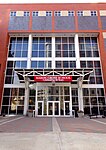New Brunswick, New Jersey

New Brunswick is a city in Middlesex County, New Jersey, United States. The city is the county seat of Middlesex County, and is the home of Rutgers University. The city is both a regional commercial hub for the Central New Jersey region and a prominent and growing commuter town for residents commuting to New York City within the New York metropolitan area. New Brunswick is on the Northeast Corridor rail line, 27 miles (43 km) southwest of Manhattan. The city is located on the southern banks of the Raritan River in the Raritan Valley region. For 2020, New Brunswick had a population of 55,266, representing a 0.2% increase from the 55,181 people enumerated at the 2010 United States Census, which in turn had reflected an increase of 6,608 (+13.6%) from the 48,573 counted in the 2000 Census. The Census Bureau's Population Estimates Program calculated that the city's population was 55,676 in 2019, ranking the city the 689th-most-populous in the country. Due to the concentration of medical facilities in the area, including Robert Wood Johnson University Hospital and Saint Peter's University Hospital, as well as Rutgers, The State University of New Jersey's Robert Wood Johnson Medical School, New Brunswick is known as both the Hub City and the Healthcare City. The corporate headquarters and production facilities of several global pharmaceutical companies are situated in the city, including Johnson & Johnson and Bristol Myers Squibb. New Brunswick has evolved into a major center for the sciences, arts, and cultural activities, bringing gentrification to the city. New Brunswick is noted for its ethnic diversity. At one time, one quarter of the Hungarian population of New Jersey resided in the city and in the 1930s one out of three city residents was Hungarian. The Hungarian community continues as a cohesive community, with the 3,200 Hungarian residents accounting for 8% of the population of New Brunswick in 1992. Growing Asian and Hispanic communities have developed around French Street near Robert Wood Johnson University Hospital.
Excerpt from the Wikipedia article New Brunswick, New Jersey (License: CC BY-SA 3.0, Authors, Images).New Brunswick, New Jersey
Seaman Street, New Brunswick
Geographical coordinates (GPS) Address Nearby Places Show on map
Geographical coordinates (GPS)
| Latitude | Longitude |
|---|---|
| N 40.486678 ° | E -74.444414 ° |
Address
Seaman Street 133
08901 New Brunswick
New Jersey, United States
Open on Google Maps









